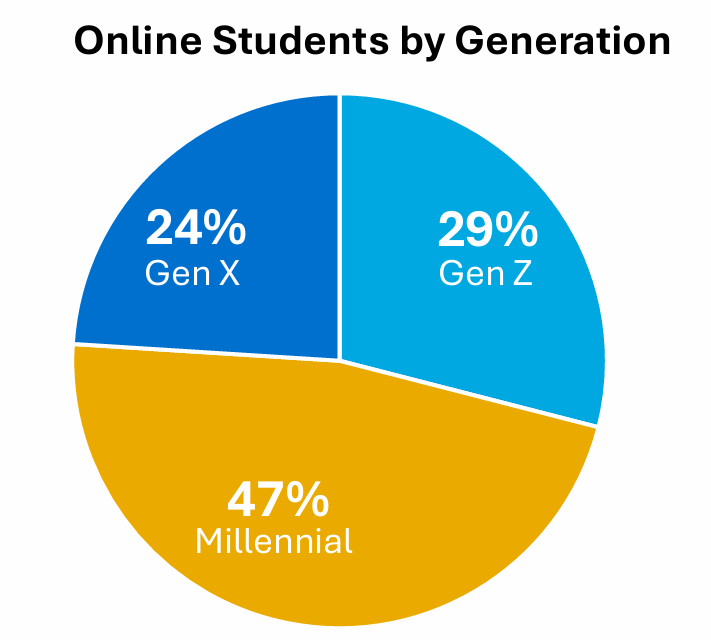
Online Generations: How do Student Expectations Differ Across Generations?
Over the last few years, there has been clear generational shift in the online education market - from “Gen X/Millennial” to “Millennial/Gen Z”. In RNL's 2024 Online Student Recruitment Report, I reported that all but 24 percent of online students are within this new demographic. In an effort to better understand whether this represents a seismic or more nuanced shift in how online programs market, position, recruit for, and organize their online programs, I wrote a special report (Generations of Online Learners) in which I laid out the areas of convergence and divergence.

Online students by generation, from the RNL 2024 Online Student Recruitment Report.
The Report: I analyzed the responses from the 15 most important questions from our national survey of online students by Gen X, Millennial, and Gen Z. I was looking for areas where expectations and preferences of the three generations converged and diverged across topics like use of AI, search patterns, recruitment expectations, and program details.
Why is this important? Ensuring that marketing, messaging, and your programs themselves connect with the right students and align with their expectations and preferences is essential to a successful growth strategy. Why? Because there are too many options available today to assume that online students will “settle” for a program that does not resonate with their point of view or align with their needs. These factors make the development of target personas for each online program critical. While this is true, there are some ‘universals” that are made clear in this generational analysis that can be applied broadly to your strategies.
Consistencies
Decision Making Priorities: Online students of all generations prefer to enroll close to home but will opt for a more distant program if they can’t find a program that meets their needs nearby. Across all three generations, they prioritize affordability, future job prospects, and convenience over reputation of the institution or location of the institution. This proves what we have known since at least 2011 with Clayton Christiansen’s groundbreaking book, The Innovative University: many students will enroll in an online program that they may know is not of the very highest quality, but otherwise matches up with their needs. Christiansen also demonstrated that upon completion rate their experience as completely satisfactory.

Distance from home for preferred online program by generation of learner. From RNL's Generations of Online Learners Report, 2024.
Primary motivations: Online students of all three generations are driven to enroll and complete their studies for career-related reasons. In fact, the largest proportions of all three generations are motivated to do so in order to advance their current career, while they differ in terms of what the next most likely motivations are (e.g.: Gen X to change careers and Gen Z to prep for their first career). These findings align with the fact that the vast majority of all three generations of online learners are also employed at the time they considered or enrolled in an online program.

The primary motivation for study among online learners by generation. From RNL's Generations of Online Learners Report, 2024.
Differences
The most important points of differentiation among the three generations include:
Gen X, unsurprisingly, differs considerably in their general use of AI and the use of an AI-driven platform in their search. However, among those who did use one, they were consistent with the other generations in their satisfaction.
While all generations are most concerned about how they will engage with their instructors, the three generations differ considerably in regard to their other most serious concerns associated with enrolling in online study.
Gen Z differs considerably from the other generations in the factors that are most important in their enrollment decision, while Millennials, interestingly, largely align with Gen X.
The three generations differ considerably on the advertising that made the biggest impact on their awareness of online programs, albeit with all three generations leading with search engines.
Students of the various generations also differ considerably in the sources they use to investigate specific online programs of interest.
This article is based on a blog post I contributed to the RNL Blog in August 2024.